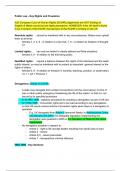Summary
Summary Public Law - Key Rights and Freedoms (Notes)
These notes cover human rights and freedoms as taught on the Public Law module of postgraduate law conversion courses (the GDL/PGDL). They can also cover topics on introductory public, administrative, and constitutional law papers taught on UK undergraduate Law degrees (LLBs). Using these notes,...
[Show more]



